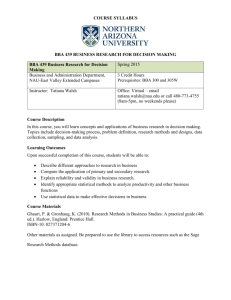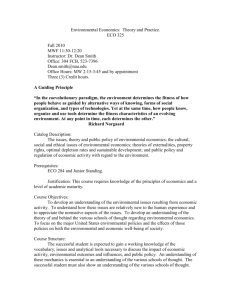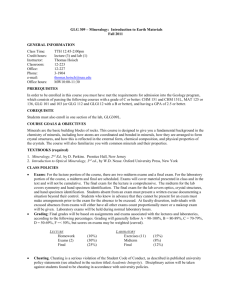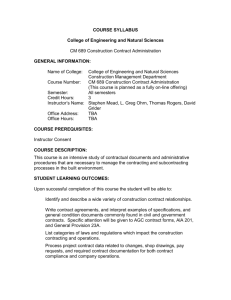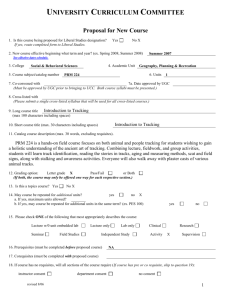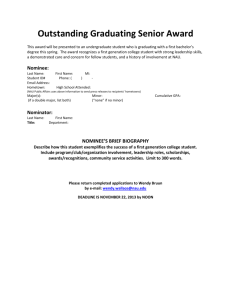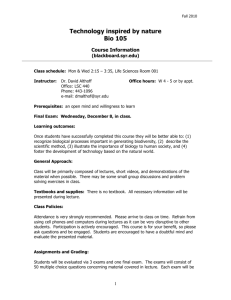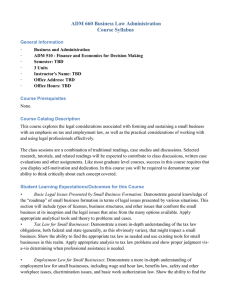GBS205 -- Chandler-Gilbert and Glendale Community Colleges
advertisement
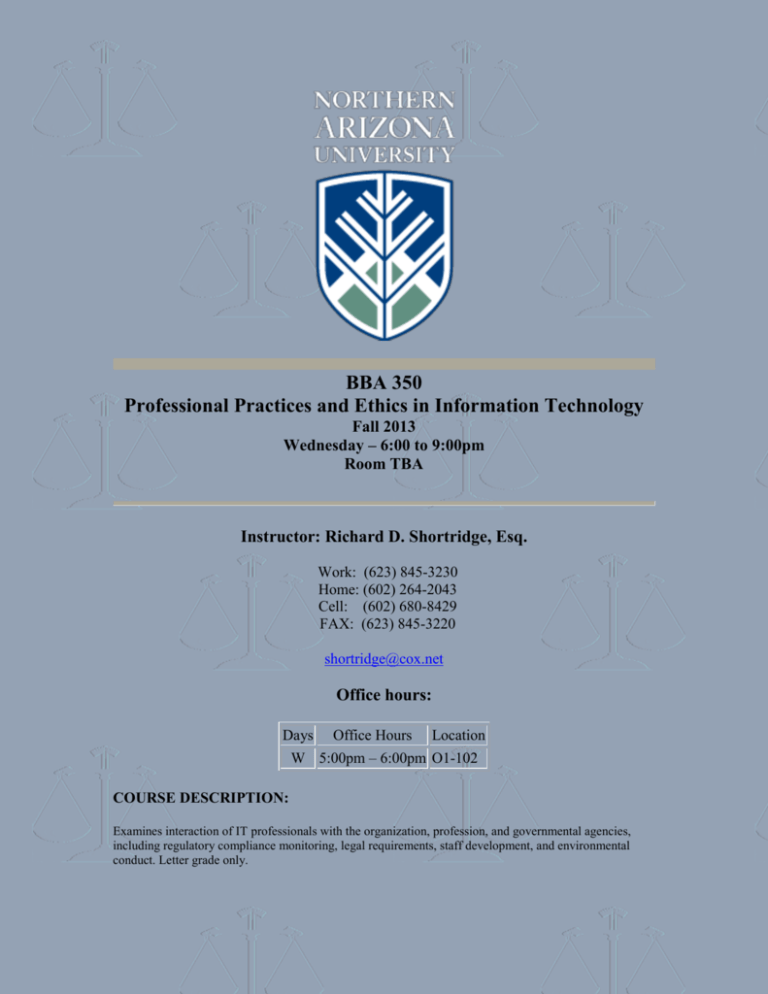
BBA 350 Professional Practices and Ethics in Information Technology Fall 2013 Wednesday – 6:00 to 9:00pm Room TBA Instructor: Richard D. Shortridge, Esq. Work: (623) 845-3230 Home: (602) 264-2043 Cell: (602) 680-8429 FAX: (623) 845-3220 shortridge@cox.net Office hours: Days Office Hours Location W 5:00pm – 6:00pm O1-102 COURSE DESCRIPTION: Examines interaction of IT professionals with the organization, profession, and governmental agencies, including regulatory compliance monitoring, legal requirements, staff development, and environmental conduct. Letter grade only. TEXT AND NEWSPAPER: Ethics in Information Technology by Reynolds, George W., 4th Edition (2012) ISBN: 9781111534127 and then Wall Street Journal. GRADING SCHEME: Points: Exams Assignments Participation Class Attendance WSJ Quizzes --------------------------Total 300 points 50 points 50 points 40 points 60 points -------------500 points Grade Scale: 90% to 100% 80% but less than 90% 70% but less than 80% 60% but less than 70% less than 60% A B C D F Notwithstanding the grade scale shown above, in terms of point totals, the top 20% of students will receive a grade of an ‘A’. All students between the median and the 79.99 percentile that have a point total below 90% will receive a grade of ‘B’. All other students will receive a grade based on the grade scale. Scores will be entered on Blackboard. The scores on Blackboard are not weighted; the weights will be applied at the end of the semester. If you have a question about any score reflected in Blackboard, let me know by e-mail within seven days of the posting of the score or within two days of the day of the final exam, whichever is earlier. EXAMS: Exams will be multiple-choice – they are not comprehensive. The exams will consist of about thirty questions. The tests are over material covered in class and in the textbook. There are no exam reviews or study guides. The exams are closed book and closed notes. Bring a #2 pencil with a good eraser exam. Exam #1 (mid-term) will be on September 18th. Exam #2 (final exam) will be on October 16th. Exams can be taken at times other than the scheduled examination period only if the student who must miss the scheduled exam contacts me in advance of the exam and adequately explains the reason for missing the scheduled exam. Should an emergency occur that limits the ability of a student to contact me prior to missing a scheduled exam, the student should contact me as soon as possible. Any exam taken outside of the scheduled exam period may differ from the exam taken by students during the scheduled period. While the subject matter of an exam taken outside of the scheduled period will be taken from the same course material as the scheduled exam, the manner by which the unscheduled exam tests a student’s knowledge of the subject matter may vary substantially from a scheduled exam. Chapters (subject to change) Exam #1 1, 2, 3, 4, 5 Exam #2 6, 7, 8, 9, 10 PARTICIPATION AND PREPARATION: You may earn up to 50 points for participation. In determining your participation points, I take into account your preparation for class and the quality of your comments. You are responsible for having read the chapter we are to cover in the class on a particular day. You should be prepared to discuss the material in the textbook at each class meeting, including the cases. In addition, it is your responsibility to stay informed on legal/business issues currently being discussed in the public forum. If you are not prepared for class discussion on a particular day, please let me know in writing before class and I will not call on you. ATTENDANCE: You may earn up to 40 points per semester for attendance. Be sure to sign the roll sheet each class period since you will not receive credit for attendance if you don’t sign in. In addition, in order to receive credit for attendance, you must arrive to class on time and remain for the entire scheduled class period; being late to class or leaving class early counts as an absence. You may be dropped from the course after two unofficial absences. WALL STREET JOURNAL QUIZZES: WSJ quizzes will be given throughout the semester. A WSJ reading list will be handed out in class most weeks. Unless otherwise announced in class, quizzes are based on the WSJ list handed out from the previous week. If a quiz is not given, the WSJ reading list that could have been tested on becomes obsolete and will not be used for testing on a future date. The quizzes are unannounced and can not be made up if missed. Generally, the quizzes consist of five true/false questions. The score on each quiz is calculated by finding the difference between the number of correct responses and the number of incorrect responses, up to a maximum score of five. The lowest WSJ quiz score is dropped. ASSINGMENTS You may earn up to 50 points for assignments. Assignments will be given out in class. ELECTRONIC DEVICES: Students shall not use electronic devices (e.g., cell phones, netbooks, laptops) during class time except with the permission of, and subject to the conditions of, the instructor. NORTHERN ARIZONA UNIVERSITY POLICY STATEMENTS Safe Environment Policy NAU’s Safe Working and Learning Environment Policy seeks to prohibit discrimination and promote the safety of all individuals within the university. The goal of this policy is to prevent the occurrence of discrimination on the basis of sex, race, color, age, national origin, religion, sexual orientation, disability, or veteran status and to prevent sexual harassment, sexual assault or retaliation by anyone at this university. You may obtain a copy of this policy from the college dean’s office. If you have concerns about this policy, it is important that you contact the departmental chair, dean’s office, the Office of Student Life (928-523-5181), the academic ombudsperson (928-523-9368), or NAU’s Office of Affirmative Action (928-523-3312). Students with Disabilities If you have a documented disability, you can arrange for accommodations by contacting the office of Disability Support Services (DSS) at 928-523-8773 (voice), 928-523-6906 (TTY). In order for your individual needs to be met, you are required to provide DSS with disability related documentation and are encouraged to provide it at least eight weeks prior to the time you wish to receive accommodations. You must register with DSS each semester you are enrolled at NAU and wish to use accommodations. Faculty are not authorized to provide a student with disability related accommodations without prior approval from DSS. Students who have registered with DSS are encouraged to notify their instructors a minimum of two weeks in advance to ensure accommodations. Otherwise, the provision of accommodations may be delayed. Concerns or questions regarding disability related accommodations can be brought to the attention of DSS or the Affirmative Action Office. Institutional Review Board Any study involving observation of or interaction with human subjects that originates at NAU— including a course project, report, or research paper—must be reviewed and approved by the Institutional Review Board (IRB) for the protection of human subjects in research and researchrelated activities. The IRB meets once each month. Proposals must be submitted for review at least fifteen working days before the monthly meeting. You should consult with your course instructor early in the course to ascertain if your project needs to be reviewed by the IRB and/or to secure information or appropriate forms and procedures for the IRB review. Your instructor and department chair or college dean must sign the application for approval by the IRB. The IRB categorizes projects into three levels depending on the nature of the project: exempt from further review, expedited review, or full board review. If the IRB certifies that a project is exempt from further review, you need not resubmit the project for continuing IRB review as long as there are no modifications in the exempted procedures. A copy of the IRB Policy and Procedures Manual is available in each department’s administrative office and each college dean’s office. If you have questions, contact Office of Grant and Contract Services, at 928-523-4889. Academic Integrity The university takes an extremely serious view of violations of academic integrity. As members of the academic community, NAU’s administration, faculty, staff and students are dedicated to promoting an atmosphere of honesty and are committed to maintaining the academic integrity essential to the education process. Inherent in this commitment is the belief that academic dishonesty in all forms violates the basic principles of integrity and impedes learning. Students are therefore responsible for conducting themselves in an academically honest manner. Individual students and faculty members are responsible for identifying instances of academic dishonesty. Faculty members then recommend penalties to the department chair or college dean in keeping with the severity of the violation. The complete policy on academic integrity is in Appendix F of NAU’s Student Handbook. Academic Contact Hour Policy The Arizona Board of Regents Academic Contact Hour Policy (ABOR Handbook, 2-206, Academic Credit) states: “an hour of work is the equivalent of 50 minutes of class time…at least 15 contact hours or recitation, lecture, discussion, testing or evaluation, seminar, or colloquium as well as a minimum of 30 hours of student homework is required for each unit of credit.” The reasonable interpretation of this policy is that for every credit hour, a student should expect, on average, to do a minimum of two additional hours of work per week; e.g., preparation, homework, studying. CLASSROOM MANAGEMENT STATEMENT Membership in the academic community places a special obligation on all members to preserve an atmosphere conducive to a safe and positive learning environment. Part of that obligation implies the responsibility of each member of the NAU community to maintain an environment in which the behavior of any individual is not disruptive. It is the responsibility of each student to behave in a manner that does not interrupt nor disrupt the delivery of education by faculty members or receipt of education by students, within or outside the classroom. The determination of whether such interruption/disruption has occurred must be made by the faculty member at the time the behavior occurs. It becomes the responsibility of the individual faculty member to maintain and enforce the standards of behavior acceptable to preserving an atmosphere for teaching and learning in accordance with University regulations and the course syllabus. At a minimum, a student will be warned if his/her behavior is considered by the faculty member to be disruptive. Serious disruptions, as determined by the faculty member, may result in immediate removal of the student from the instructional environment. Significant and/or continued violations of this policy may result in an administrative withdrawal of the student from the class. Additional responses by the faculty member to disruptive behavior may include a range of actions from discussing the behavior with the student to referral to the appropriate academic unit and/or the Office of Student Life for administrative review in an effort to implement corrective action up to and including suspension or expulsion from the University. Student Code of Conduct For a copy of the complete code, visit WWW.NAU.EDU/~STULIFE/CODE or call 928-523-5181
